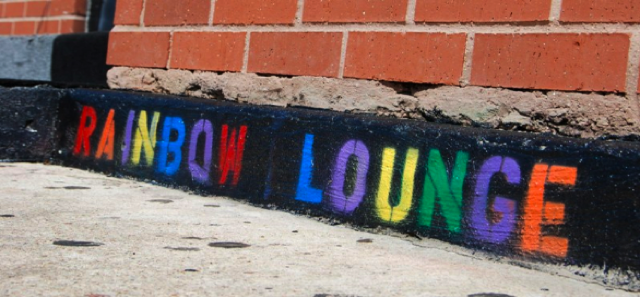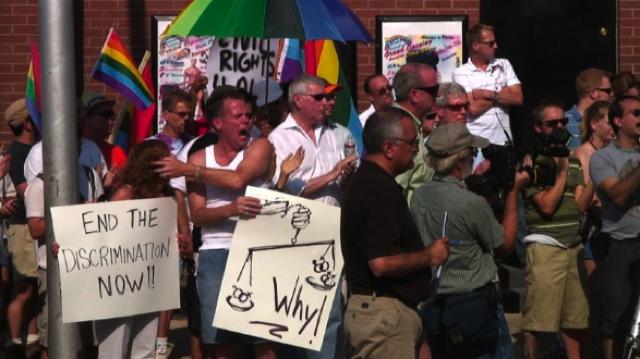
I am not one keen to reviewing documentaries and my reasoning is simple: judging aesthetic or editorial choices of documentarians often obscures the subject matter—particularly documentaries that were filmed in-time with the event they are attempting to analyze. And when dealing with a multifaceted, deeply intense issue such as contemporary hate, I feel it is appropriate to relegate the discussion as to why the film was made in the first place.
This is not to say I didn’t want to write my initial opinion on The Raid of the Rainbow Lounge—one of the many documentaries showcased at this year’s QFilms.
The documentary, upon my first screening, was what I was immediately tempted to call amateurish in its presentation: cuts which exacerbated immediate conclusions, sounds that heightened anxiety and hypothetical questions via a voiceover that induced deep-seeded paranoia highly reflective of when I was still in the closet.
But perhaps this was the entire point—after all, documentarian Robert Camina told me his insistence that he would not let the event “fade into the past, reduced to folklore.” And while one might be able to argue that Raid uses hyperbolic tactics to engage his audience towards his own perspective, there is no doubt that Camina was single-handedly attempting to show a community that was frightened by the powers that were supposed to protect them.
“I wanted the film to be fair, accurate and responsible,” Camina said. “I didn’t want it to be dismissed as a ‘propaganda’ piece. I am critical of the LGBT community, as well as the officers and city leaders. I was not going to perpetuate mistruths, like internet claims that spread rapidly.”
On June 28, 2009—eerily and disturbingly 40 years to the exact date following the Stonewall Riots in New York—a team of Fort Worth Police officers paired with enforcers from the Texas Alcoholic Beverage Commission made a stop at the just-opened Rainbow Lounge. The bar was an attempt to revive the previously bourgeoning southern area of Fort Worth, where a thriving LGBT community had been fostered but eventually gave way to dilapidated buildings and empty lots.
What was initially called a routine check ultimately led to what was formally denounced by the community as a raid: police officers stormed in, using public intoxication to arrest and detain multiple people who had done little to nothing. One of those arrested, Chad Gibson, was sent to the hospital with multiple skull fractures and bleeding into his brain.

Camina, a Texan himself, felt compelled to document the unfolding saga as the local community began to cry out in what many dismissed to be a thing of the past.
“I think it’s important for people to realize that events like what happened at the Rainbow Lounge are still happening in our lifetime,” Camina explained. “This is the kind of world where members of the LGBT community are forced to live in: a world flourishing with fear, homophobia and intimidation.”
Of course, when the film was complete, it was hard not reflect on my own privileges as well as my the tribulations of my past. Having grown up in Big Bear, I knew of fear and homophobia and intimidation—and I stepped away from it, to search out LGBT friendly metropolises like Los Angeles and San Francisco to dive into. But for some, particularly those who love their home, stepping away is neither noble nor what they desire. They see a possibility, much like the people of Fort Worth saw: they didn’t see what Fort Worth was or is, but saw what it could become if someone doesn’t speak up. Camina explained:
I think that tends to be human nature: people feel that, just because life is better and more accepting for them, it must be for everybody else. I still get upset when I hear people say, ‘What do you expect? It’s Texas!’ I recognize that in general, Texas has a bad reputation when it comes to LGBT issues. However, there are many incredibly hard working leaders and brave politicians in the state, relentlessly working towards change and equality. There are many cities in the state that have anti-discrimination ordinances, many of which include protection of the transgender community. Many cities provide diversity training and there are openly gay politicians, including Annise Parker, the first openly gay mayor of Houston. Major cities offer domestic partner benefits, including Dallas, Fort Worth, Austin, San Antonio and El Paso. While the state is not entirely inclusive, Texas is not as hostile and intolerant towards the LGBT community as people from outside the state think.
It was following this statement from Camina that the simplicity of the film’s direct attack came through. More than being about an egregious, perturbing attack that was both unwarranted and unexplained by officials, it is about the power of a community rising up to fight stereotypes from both inside and out—and about creating the history of the LGBT community that has, by the powers that be, been largely ignored.
Beyond my criticisms of its aesthetic choices and beyond my criticisms of its editorial choices—perhaps both influenced by removal from such events, perhaps my iconoclastic instinct, perhaps neither—there is a far more pertinent philosophical point to be made: Camina documented Americans refusing to remain seated and quiet, refusing to be apathetic about a wrong doing.
And that is far more beautiful and thought-inducing than any film cut can be.
****
The 2012 QFilms Festival will occur September 14, 15, and 16. Raid of the Rainbow Lounge will be shown on Saturday, September 15 at 12:30pm at the Art Theatre, located at 2025 E. 4th Street.
For the complete lineup of the films playing at this year’s QFilms, click here.
For more information about the festival, visit www.qfilmslongbeach.com. Passes and tickets are available through the link provided. Submissions for this year’s festival are closed but 2013 submissions will be accepted beginning October 15 via www.withoutabox.com.

